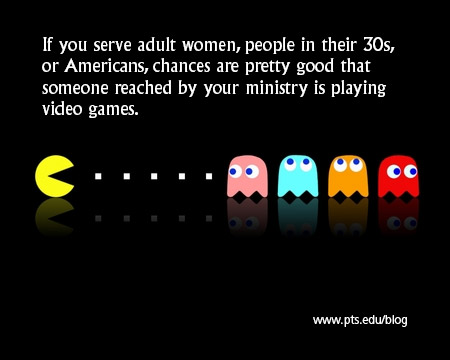Your ministry has been impacted by a debate that you probably didn’t know was happening. It has involved major Universities, news outlets, and even the FBI. You probably missed it because it’s about something you don’t usually notice. It’s about video games.
But why would a seminary blog bother discussing a debate on video games? Here are some facts that may help explain.
- More adult women play videogames than teenage boys.
- 71 percent of video game players are old than 18.
- The average video game player is 31 years old.
- 59 percent of Americans play video games.
(These numbers are from the Entertainment Software Association. The full report is here.)
Think about the people served by your ministry. If you serve adult women, people in their 30s, or Americans, chances are pretty good that someone reached by your ministry is playing video games.
Convinced? Good. Because what’s happened this week is very important to your ministry.
Threats of a school shooting set off a chain of events that forced the cancellation of a lecture at Utah State University. The speaker is known for her criticism of the way video games portray women. It’s been covered by several major news outlets like CNN and Time.
This is the most recent event in what’s been called “gamergate.” Without going into unnecessary details, it’s become a fight about the portrayal of women in video games.
The people your ministry reaches are playing video games. Those games shape our identity and our ideas about things like gender. Consider this: Statistically speaking, the 31-year-old woman in your congregation probably didn’t read Galatians 3:28 this week. “There is no longer Jew or Greek, there is no longer slave or free, there is no longer male and female; for all of you are one in Christ Jesus.” She probably did play a video game.
The average American video game player spends 6.3 hours a week playing video games.
Most Americans read the Bible less than once a week.
This is why issues like “gamergate” are important for your ministry. You don’t need to jump into the debates. You don’t need to follow the minutia. You do need to know that a major source of influence on the people in your ministry is struggling to articulate how it will inform our cultural identity.
The Rev. Derek Davenport ’05/’17 is a PTS alumnus of the Master of Divinity (MDiv) Program and Master of Sacred Theology (ThM), between which he served at a church in Orlando, Fla., for five years. Derek also participated the Seminary’s Miller Summer Youth Institute. He serves as a preacher in Western Pennsylvania, researches church symbolism on his website, and tweets at @DerekRDavenport.

